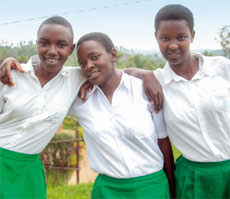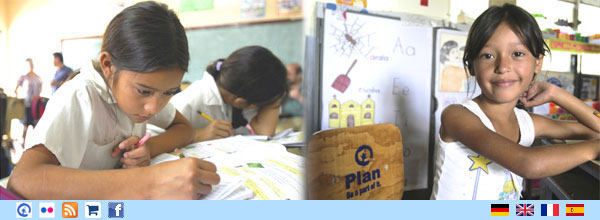In Rwanda, 47% of the population is under 18 years old. The education of this young generation is crucial for the development of this country.
However, many children drop out of school early. Traditional role models prevent especially girls from exercising their right to education.
In particular, early pregnancies, gender-specific disadvantages and violence contribute to girls school drop out. Plan has set itself a special
goal from this project: 100 adolescent mothers who have dropped out of school should receive vocational training, which cost about 269 euros each.
The aim of this project is to improve the educational situation for children in this country on a broad basis. Here are a number of individual measures
this project implies in the project regions Bugesera and Nyaruguru:
 |
In 20 elementary and secondary schools, learning conditions for 6,900 girls and boys will be improved by training teachers
and providing new teaching material and school equipment.
In addition, the set up of 25 kindergartens is planned for approximately 5,250 infants. Around 1,000 parents of these children are being
continuously trained in 25 parent groups on topics such as early education, child health and nutrition.
|
Training for 900 children on children's rights and equal rights is planned.
These children are expected to transfer their newly acquired knowledge to the remaining 6,000 children.
50 savings groups for 1,250 parents of children are being set up to found community microenterprises.
100 adolescent mothers receive professional training, for example in the hospitality industry, in tailoring or hairdressing business.
Starter kits with tools for beginning a career should facilitate the step into self-employment.
As part of the project in Rwanda, we have chosen the last point in particular to promote this project:
|
100 young mothers who left school receive
vocational training within this project. Each training costs per mother 269 euros.
We financed 69 of these training courses.
|
| |
|
|
| |
|
|

